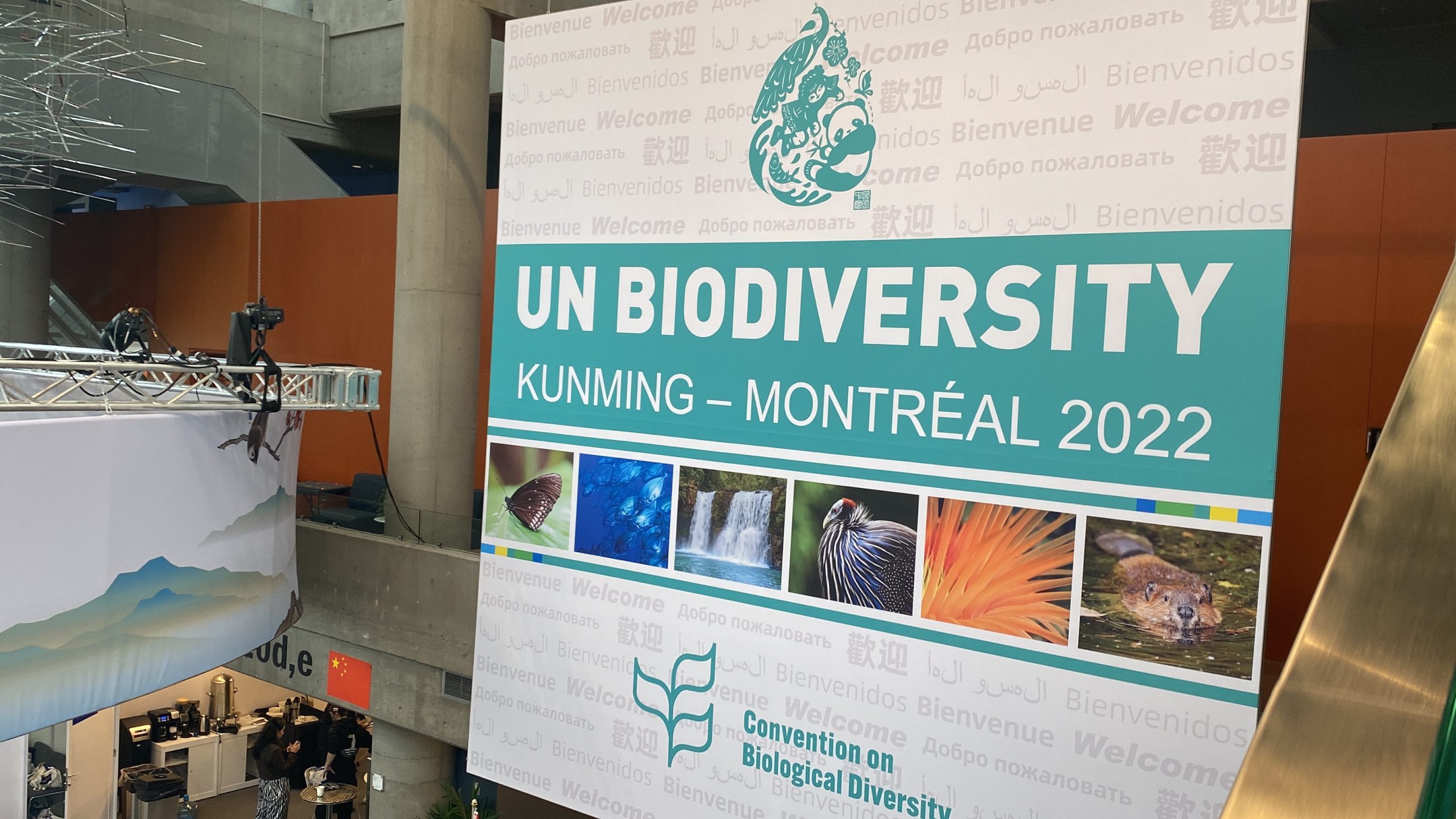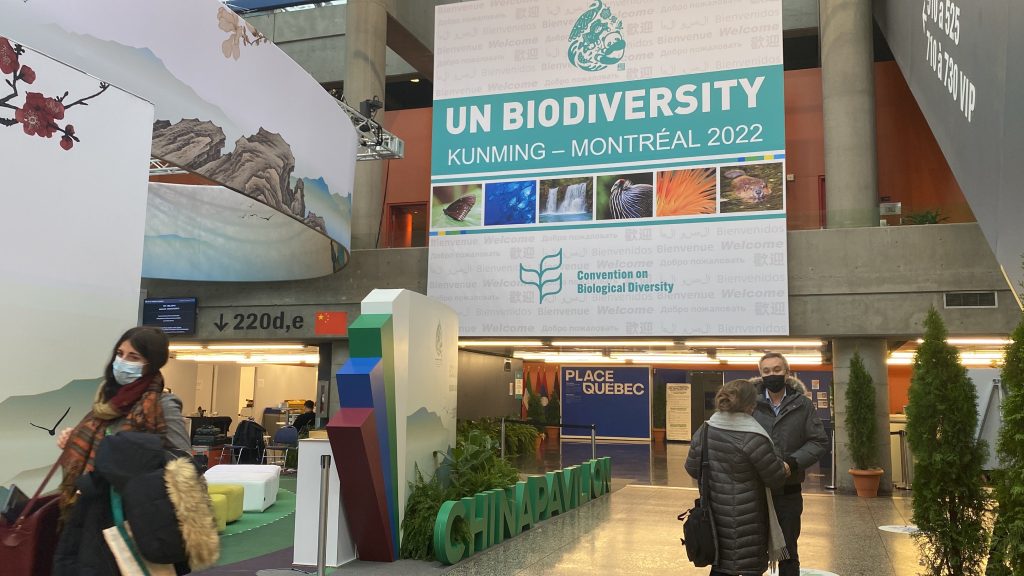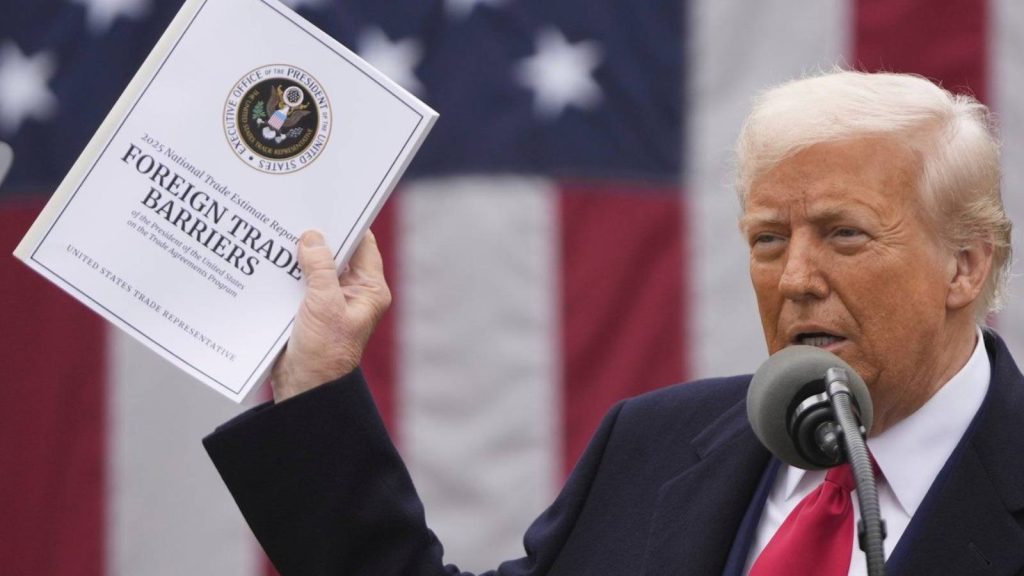Countries at COP15 finalize deal to halt, reverse destruction of nature by 2030

Posted December 19, 2022 5:17 am.
Last Updated December 19, 2022 6:40 pm.
MONTREAL — A new global agreement to save nature from human destruction was passed overnight Monday at COP15, the biodiversity conference in Montreal, despite objections from a number of African countries that accused the Chinese presidency of forcing a deal through against their objections.
An announcement issued early Monday morning says the nations at the biodiversity summit have agreed to four goals and 23 targets.
The goals include protecting 30 per cent of the world’s land, water and marine areas by 2030, as well as the mobilization, by 2030, of at least $200 billion per year in domestic and international biodiversity-related funding from all sources, both public and private.
#WATCH: A new global agreement to save nature from human destruction was passed overnight Monday at COP15, the biodiversity conference in Montreal. The nations have agreed to 23 targets to protect 30 per cent of the world’s biodiversity by 2030.
READ: https://t.co/JFgLPzus17 pic.twitter.com/jHVOE4Zc47
— Alyssia (@rubertuccinews) December 19, 2022
There is also a pledge to reduce subsidies deemed harmful to nature by at least $500 Billion by 2030, while having developed countries commit to providing developing countries with at least US$20 billion per year by 2025, and $30 billion per year by 2030.
RELATED: COP15 nature negotiations racing to finish line but disagreements still plentiful
China’s environment minister, Huang Runqiu, lowered the gavel and declared the deal to be done around 3:30 a.m. in Montreal, prompting a standing ovation.
“Distinguished delegates, after four years of work, we have now reached the end of our journey, and we have before us, the fruits of our work,” Huang said. “This is a historic moment.”
Shortly after the gavel dropped, Canada’s Environment Minister Steven Guilbeault said the deal is “a bold step forward to protect nature.”
“To protect the air that we breathe, the water that we drink, and for that, Mr. President, we are extremely grateful.”
But Huang’s gavel drop came minutes after the representative at the table from the Democratic Republic of Congo indicated his country couldn’t support the deal, largely over concerns about how the financing will work.

(Photo Credit: Alyssia Rubertucci, CityNews)
“The DRC is unable to support in its current state,” the country’s representative said through a translator.
“We need resources to be able to implement the framework. And the COP has not provided this strategic resource mobilization plan that was expected,” explained Cécile Ndjebet, president & founder of African Women’s Network for Community Management of Forests.
That led to a number of other African delegates, including from Uganda and Cameroon, to object. Uganda’s representative accused Huang of a “coup d’etat” against the biodiversity talks.
Cameroon’s delegate said Huang had “twisted the procedure” and pushed through the whole deal with “a force of hand.”
A legal adviser to the proceedings said because the DRC’s comments had not been a “formal objection,” there was nothing wrong with Huang declaring the deal passed prompting the DRC delegate to come back and say his objection was a formal one.
None of the objections appeared to matter in the moment, though there are concerns about what it could mean for implementation. The agreement is not legally binding, and any country can choose not to follow the targets if they don’t want to do so.
Some of the historic measures include Effective conservation and management of at least 30% of the world’s ecosystems – since currently only 17 per cent of the world’s lands and 10 per cent of waters are under protection.
They are also looking to cut global food waste in half. And reduce to near zero the loss of areas of high biodiversity importance.
#WATCH: “This is a pivotal moment,” says Gopal Patel of the Multifaith Coalition at COP15, after an agreement was reached by 196 countries at the conference surrounding the 10-year framework that outlines how they will protect nature.
READ: https://t.co/JFgLPztUbz pic.twitter.com/zq9xjSwIjh
— Alyssia (@rubertuccinews) December 19, 2022
“If we were to assemble in seven years, in 2030, and we would have accomplished everything that is in this agreement, it will be a very different planet and it’s going to be a major change.” said Basile van Havre, Co-Chair of the Open-ended Working Group on the post-2020 global biodiversity framework.
In a scrum with reporters following the passing, Guilbeault tried to downplay the African countries’ concerns, saying other global environment agreements have also had such objections.
Guilbeault said there is already outreach being made to the DRC about its concerns, but he said he doesn’t think there is a legal problem with how Huang handled it.
“I think the presidency acted within guidelines,” he said.



As the conference neared its final official day, Guilbeault said some countries were still asking for the inclusion of more ambitious numerical targets, while others in the global south continued to push for more funding.
The new agreement is titled the Kunming-Montreal Global biodiversity framework after the official host cities in China and Canada.
The deal was four years in the making. It was delayed four times because of COVID-19. The final negotiations ultimately moved from China to Montreal because of China’s ongoing pandemic restrictions.
The final agreement came after nearly two weeks of negotiations among 196 countries who are part of the UN biodiversity convention. They were seeking a new deal to halt the human destruction of nature and to begin restoring what has already been lost.
The United Nations says three-quarters of the world’s land has been altered by human activities and one million species face extinction this century as a result.








